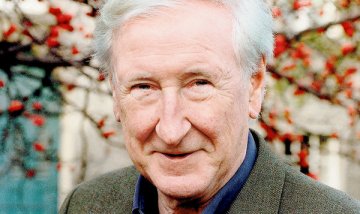Poet and MA student Úna Ní Cheallaigh mourns the loss of the late poet John Montague’s voice and, in particular, the lyrical notes of his home place in Tyrone, a heritage that she shares with him.
I found myself reading Montague again today.
Yes, reading silently the poems of John Montague, poet and teacher. His final collection, Second Childhood was published earlier this year by Gallery Press. This was to be launched initially at the Cork International Poetry Festival in February, with the poet reading from his work.
But in the words of the Scots poet Robert Burns –
The best laid plans of mice and men –
Gang aft aglay and leave us nought
But grief and pain for promised joy.
John Montague departed this world unexpectedly on December 10, 2016, and instead of reading to us at the festival, the event became a tribute to Montague the man, the poet, by a younger generation of writers who were privileged to have known him, having him as mentor and teacher when they studied at UCC, spending many hours with him at his home on Grattan Hill. We were not left with grief and pain but a gift of poetry that will be ours for as long as it is read by those he inspired and tutored in the craft.
On that very special occasion, hosted by Theo Dorgan, words of tribute were spoken by his publisher Peter Fallon; poems read by former students Greg Delanty, Thomas Mc Carthy, Gerry Murphy, Liz O’Donohue and Theo Dorgan. His daughter Sybil read “Bird Boy”, the final stanza singing to us –
the grown man, serving his guests
plates scented with saffron,
ragged leaves of coriander, cumin,
halts, as phantom birds begin to sing.
As I listened to the poems being read I became unsettled. I could not put my finger on it. The disquiet stayed with me. Days later it dawned on me. Yes that phantom bird on my shoulder, the voice I hear when I read his poems silently, John’s voice. I realised I had never heard anyone else read his poems aloud. He was raised in Co. Tyrone and his voice was that of my grandfather’s people who grew up on a farm near Fintona, not far from his maternal home, a place he brings us to in his poem ,”The Locket” –
Of your wild, young days
which didn’t last long, for you,
lovely Molly, the belle of your small town,
His poems are full of places I heard talked of, Ballygawley, Garvaghy and Glencull and songs learnt in school – the”Eriskay Love Lilt” of his poem, “The Old Pathway”. Even though he lived abroad for many years in America and in France, his accent remained Northern, always an Ulsterman. He embraced so many other cultures but still the voice remained the same. Hearing his poems being read by others in different voices was like a rite of passage for his work. I was familiar with most of the poets who read that night. I had heard them read their own work in public before, so this added to the strangeness of it all. Now as I read Second Childhood quietly to myself, I carry his voice with me, my second voice, the lilt and cadence of the line will always be Fintona, Garvaghy and Glencull –
That note of impossible longing
Montague gives me back the voice of my people, their farm in Fintona sold, a way of life lost. His voice in my ear as I write, stirring me to speak of Mc Phillemy, Shannon and McNally, my lyrical voice will always be Tyrone – Tír Eoghan – John’s Country.
This post originally appeared on writing.ie – https://www.writing.ie/guest-blogs/of-montague-and-me-guest-post-from-una-ni-cheallaigh/

